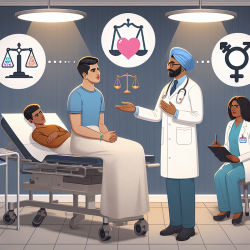Understanding Clinician Perspectives on Transgender Health
Access to competent healthcare remains a significant barrier for transgender individuals, contributing to health inequities. A recent qualitative study explores clinicians' perspectives on providing transgender healthcare, highlighting challenges, knowledge gaps, and strategies for success.
Key Findings from the Study
The study involved 13 clinicians, including physicians, nurse practitioners, and physician assistants. It identified five main themes:
- Knowledge Acquisition: Clinicians gained competency through formal education and informal mentorship.
- Perceived Challenges: Knowledge gaps and fear of providing non-standardized care were significant barriers.
- Power to Deny: Gatekeeping practices often restricted access to hormone therapy.
- Stigma: Stigmatizing beliefs impacted patient-clinician relationships.
- Reflections: Clinicians shared strategies for success and personal motivations for providing care.
Strategies for Success
Clinicians emphasized the importance of mentorship, self-directed learning, and clinical experience in building competency. Person-centered and harm-reduction approaches were crucial for establishing trust with patients. Clinicians also highlighted the need for supportive organizational environments that foster inclusivity and provide resources for transgender care.
Encouraging Further Research and Education
While the study provides valuable insights, it underscores the need for ongoing research and education to address the persistent barriers in transgender healthcare. Clinicians should be encouraged to engage in continuous learning and self-reflection to improve care delivery.
To read the original research paper, please follow this link: Interdisciplinary clinicians’ attitudes, challenges, and success strategies in providing care to transgender people: a qualitative descriptive study.










